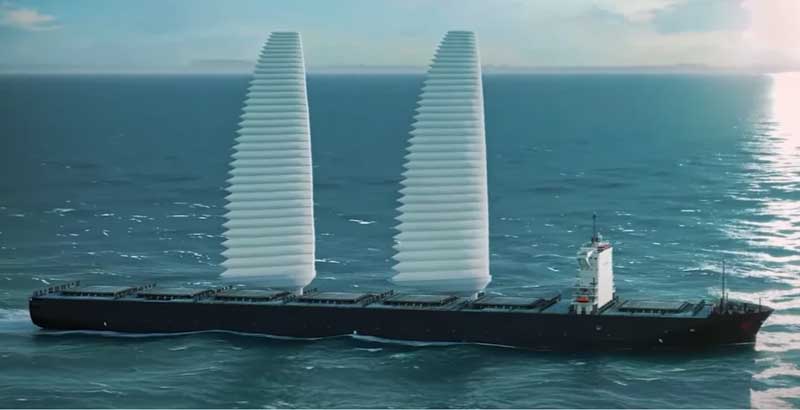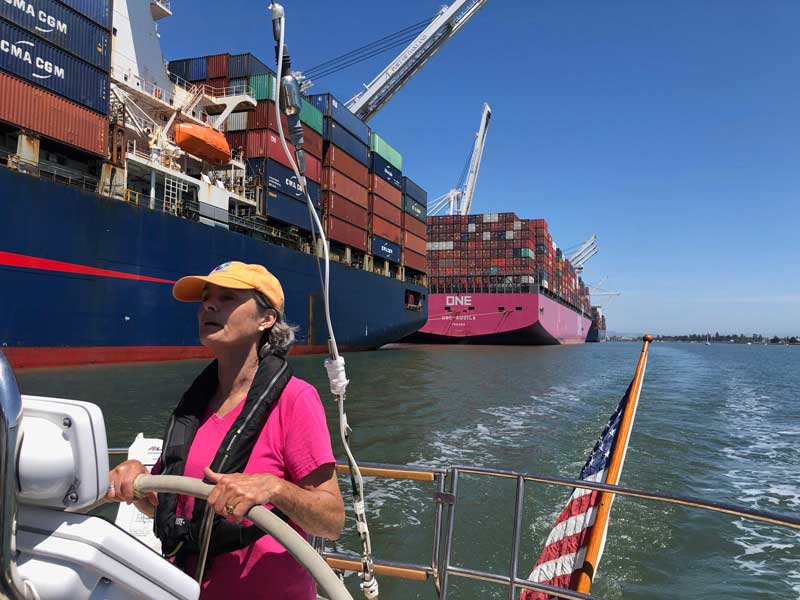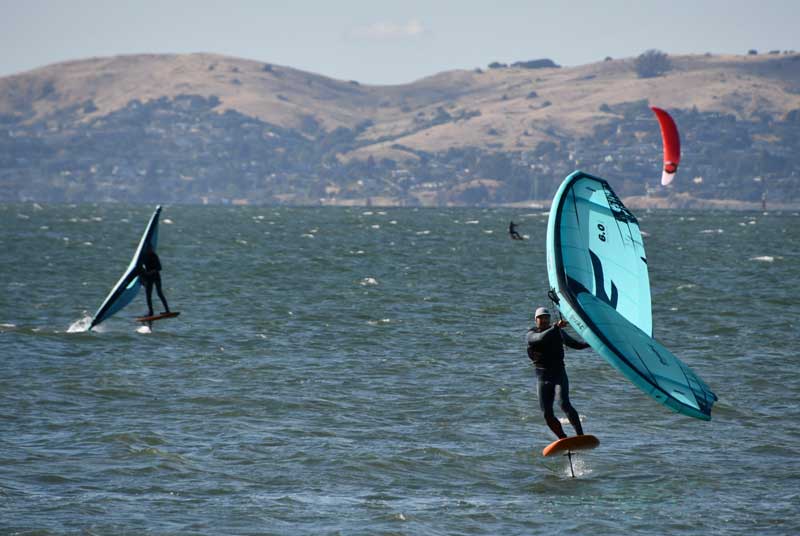
Michelin Wings Its Way to Sustainability with Sailing
While World Ocean Day is just one day (June 8), we’re taking the month of June to share more good news about sailors leading the way toward ocean and planetary sustainability. Foiling and wings are all the rage in yacht racing (see story above), but many other applications are in development. Michelle Slade just sent an article from New Atlas about the new Michelin Wing Sail Mobility Project (WISAMO). As we saw with the Energy Observer, which just sailed through San Francisco Bay, French sailors are experimenting with how to get to a zero-carbon future.

The thousands of containers at the Oakland Terminal sit at the end of a long, plugged-up supply chain. They all arrive by burning very heavy, dirty bunker fuel. They won’t get here with wings alone, but wing-assisted ships could dramatically reduce the climate impact of fossil fuel-burning ships.

Michelin says inflatable wings would help decarbonize maritime trade by reducing carbon emissions by 10-20%. The wings are inflatable, so they are automatically retractable without the need of crew members. The WISAMO project is joining many creative wind-power projects that hope to revolutionize low-carbon transportation. While it appears far-fetched at the moment, there’s a growing amount of human energy and capital being invested that will continue surprising us with positive results.

San Francisco Bay is home to some of the world’s best kite and wing sailors. The 2013 America’s Cup was a stunning transformation, and new forms of kiting and foiling are appearing all the time. Sailors, kiters and wing sailors can sail all day in the breezy Bay Area without burning any fossil fuels. As Tim Henry wrote in 2019, in the Bay Area Jay Gardner of Adventure Cat has been leading the charge by developing the Wind + Wing foil-assisted ferries. One thing that appears common to almost all sailors is respect and reverence for the oceans plus curiosity and ingenuity in how to reliably harness nature’s forces for a sustainable future.

Don’t worry about too much CO2 in the air. The physics of it doesn’t support climate change alarm in spite of the propaganda drumbeat. We do want to save hydro-carbon fuels because they will become very scarce in a thousand years at present consumption. Humanity has existed for a couple hundred thousand years and we want to last for millions. We need a systems approach to converting to renewable energy where ever possible but we don’t need a panic, rush job like whats going on now in Europe, the US and especially California. The project bidding credo “Price, schedule, quality, pick two” assumes a rational systematic approach. With the current politicized climate panic designed mainly to transfer wealth, we are getting “Price, schedule, quality” pick zero.
That said, I love the idea of sail assisted cargo ships. My great grandfather was the last family member to sail cargo schooners until steamships drove him out of that business. Modern sail assisted cargo ships have the potential to be cost effective compared to current ships and much safer and less labor intensive than the sailing ships of old.
Doug — Just out of curiosity, when do you think we should we start worrying about certain environmental red flags? Are these heat waves a concern? Or the longer, more intense fire seasons? Or more plastic in the ocean than sealife? What would qualify as justifiable ‘panic?’
Recent, interesting, additional editorial from the New York Times: https://www.nytimes.com/2021/06/24/magazine/cargo-ships-emissions.html?referringSource=articleShare
@ Tim Henry.
1. We should start worrying when knowledgeable independent scientists (not depending on government/activist grants) make scary but precise predictions which which are then confirmed with reliable data using standard statistical methods. I am a retired physics guy who worked as an engineer in defense. Everything new needed very good proof that it would work, especially if we were pushing the boundaries of what could be done, and confirmation by test. I haven’t seen anything like proof that the bad effects of more CO2 (if there are any) exceed the beneficial (which are clear). All I have seen is a widespread PR campaign ranging from politicians’ fear mongering for votes to news story throwaway remarks that global warming may have been a factor in every disaster (yes even the Florida condo collapse).
2. Heat waves seem no worse than in the past seventy years and because of temperature record adjustments, reports saying they are are not making valid comparisons.
3. “Intensity” is too vague a concept for wildfires. They burn fewer acres then a hundred years ago in the lower CO2 past but you can’t make valid comparisons probably because there is less wild area to burn now and forest management methods have changed so no there isn’t any proof it is a CO2 problem. Even if you think wild fires are mainly a drought problem and the current 5 year long drought is the worst in 500 years, it certainly isn’t worse then the 100 year long drought around a thousand years ago.
4. Plastic in the ocean is a different but non-CO2 problem entirely. It is certainly ugly, it harms some sea-life, but it has no significant effect on the climate. In time the plastic will become CO2 and water.
5. Your panic is never justified but panic is useful to get other people to do what you want them to do before they think out the situation.
Doug – we’re not sure when or if we should all panic when it comes to climate change. Nobody can prove definitively to everyone when or if any action is needed to prevent a global calamity. However, we do know there are many humans resting in graves who waited for proof that smoking dramatically increases the chance of getting lung cancer. Or thought there might be a higher chance of dying from wearing a seat belt or fought in wars they were told we were winning when we were actually losing. Still, any of these perspectives can be debated today.
However, as sailors, we tend to be conservative. We reef early and let out extra scope when we sense danger. Living in California we’re more prepared to abandon our house when we smell smoke and not when the flames are at the front door. There have been heatwaves before and ice ages over the eons but no species has willingly tossed zillions of tons of CO2 into the atmosphere and crossed their fingers hoping for the best.
Fossil fuels and the oil industry should be commended for the enormous benefits they’ve bestowed on us over the last 150+ years. The use of fossil fuels has improved all of our lives. But everything has its limits and the signal that we’ve all crossed a dangerous line is rarely clear. One rum and tonic can be great but, somewhere down the line, it can be fuzzy knowing when you’ve had one too many. Similarly, ‘financial innovation’ with derivatives seemed like a stellar idea up until about December 2008 when it suddenly wasn’t. Despite the innumerable times the weather folks have been wrong we still bring an umbrella when they say it’s going to rain. We don’t believe there will be a day when there is universal agreement on any threat.
We can’t prove anything to anyone but we can say, our personal belief is it is time to reef. We see storm clouds brewing and feel it is urgent for humanity to dramatically reduce its carbon footprint. If we could we would wave our magic wand so all our energy needs were suddenly met by reducing demand with more efficient product design and transforming our energy sources to 100% sustainable. We’d also make sure all people who currently preserve the fossil fuel industry because it sustains their family would have other creative and fulfilling ways to maintain a livelihood. We’d be thrilled to never have to do an oil change on our car or fill up at a gas station again. Selling opioids may pay your mortgage but that’s not a good reason to keep selling them.
Beyond ourselves, we act out of concern for our children and future generations. If it turns out we’re wrong about climate science and we actually can burn up all the planet’s oil without impact our grandchildren will be very happy we saved some for them. For humanity, oil is has been like a planetary trust fund. It was formed and collected over eons. Wouldn’t you be embarrassed to be the unappreciative beneficiaries who blew the trust fund in one 200-year, oil-fueled orgy? Conservative people conserve and we should respect the wisdom that sentiment.
Our own lives are far from perfect examples of what may be needed to save the world but we do know the direction we want to move. We don’t think we should be looking for reasons to slow the pace. Is it panic or progress? We don’t care. We see a better world ahead if we all embrace a new energy future.
Doug — If you look at almost any climate-change denier rebuttal, you’ll see that you have followed the standard format, especially on this point: The denier has some kind of background in an unrelated field of science, and therefore seems qualified to speak broadly about the efficacy of climate data. You then imply that some scientists are faking the data to keep the grant money flowing. You, along with other deniers, are essentially saying that you, and you alone, are qualified to judge the data, but full-time climate scientists are not, because they’re corruptible.
Respectfully, this argument is tired, and ultimately irrelevant.
Climate change is a political third rail, because no voter wants to hear that their everyday actions, like driving to work and using the air conditioning, are destroying the planet. It’s absurd to imply that politicians can use climate change as a way to marshal votes. Who would vote for a candidate that runs on a platform of $15 for a gallon of gas to finance green innovation? Even those of us on who support aggressive climate policy aren’t quite ready to go vegan and give up our gas-burning cars.
It was 116 degrees in Portland, Oregon, yesterday. Again, Doug, the question we’re putting to you is: When SHOULD we be alarmed? At 120 degrees? One-twenty five? (The heat was so severe yesterday that street-car cables were melting.) Or is it all just somehow relative, and can always be dismissed as normal, cyclical planetary changes — all while ignoring human actions? (Yes, two billion years ago, Portland probably saw some 160-plus-degree days as continents were colliding and volcanos were erupting.)
Do you think that humanity is entitled to burn fossil fuels without consequence or even insinuation that it might be unsustainable?
Should those of us who have lived in the Bay Area the last five years ignore air-quality warnings? Should we have gone for a run last September when the smoke was so bad that even a brisk walk outside caused serious irritation to the eyes and lungs? Who should we blame? Forest managers? The truth is, we don’t blame anyone. We just hope it doesn’t get any worse (we’re past thinking it will get better), and we’re willing to try anything to make sure that it doesn’t.
With all due respect Doug, and with a sincere gesture that we might find common ground, we put these questions to you: What are YOU willing to do for the planet? What sense of stewardship do you have? What do you hope to pass on to your children, or to the next generation? Do you throw your trash into the water? Do you pour old oil into the Bay? No? Well then, at some level, you’re making an effort to take care of the environment, and the rest is just a matter of degree.
Please realize that humanity is not entitled to live statically on old, antiquated technology. (Should we have kept hunting whales for their oil to keep the lights on?) Humanity has always changed and adapted to its surroundings. All we’re advocating for is the normal, market-based evolution of ideas and technology, which both creates industry and can offer the consumer low-cost, renewable options — and, if we’re lucky, keeps the planet healthy, or just livable, for our kids.
Doug said – “We should start worrying when knowledgeable independent scientists (not depending on government/activist grants)”
Oh, like fossil fuels industry shills? The number of contrarian climate scientists is vanishingly small, compared with those who agree on AGW. And a good percentage of the contrarians are fossil fuel shills.
Others hold to anti environmental regulations that may affect the industry. Like Roy Spencer, who sits on the board of directors of the George C. Marshall Institute. Roy made this statement.
“I view my job a little like a legislator,
supported by the taxpayer, to protect the
interests of the taxpayer and to minimize
the role of government.”
No, Roy. You are paid to do science, period.
So that’s what he does at University of Alabama Huntsville, where he’s in charge of the global temperature data set (UAH)?
Roy is also a creationist As such, Roy Spencer signed the following declaration.
“We believe Earth and its ecosystems – created by God’s intelligent design and infinite power and sustained by His faithful providence – are robust, resilient, self-regulating, and self-correcting, admirably suited for human flourishing, and displaying His glory. Earth’s climate system is no exception.
How is it that climate scientists from all over the world, researching at universities and government agencies, with governments across the political spectrum and from lots of different cultures have all joined some kind of conspiracy, a hoax, with a political agenda. To me, this is the most absurd of all denier arguments. Who has politicized the science is not the mainstream scientists.